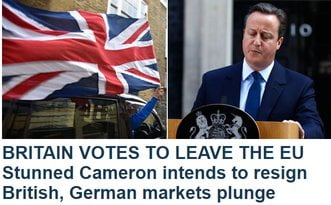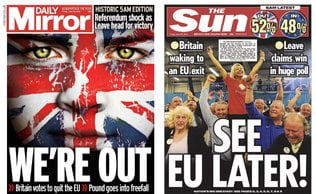Britain is the second-largest EU economy after Germany. It also has a seat on the UN Security Council, and it’s a close ally of the US, and of course, Australia.
Last year, Britain’s government borrowed an equivalent of 4.4 percent of its gross domestic product. The only EU nations with a higher level of borrowing are Spain and Greece, both troubled economies that have required some form of bailout.
Britain’s trade is in a dire position. Its current account deficit is at 7 percent of GDP—the highest peacetime level since records began in 1772. At the heart of this problem is the simple fact that Britain is importing far more than it is exporting.
BREXIT (the vote to leave the EU) was motivated by the following fears and concerns:
- Over 300,000 immigrants directed from the EU settling in the U.K. in 2015 taking jobs and straining public services.
- The inability to negotiate trade agreements unless all 28 nations of the EU agree and vote to adopt the agreement so trade with India and China and Australia were stalled.
- Fears of a German proposal for an European Army separate from NATO, and the possibility of Turkey joining the EU and the subsequent new flood of economic refugees.
A short history of Britain in Europe
1951 – European Coal and Steel Community founded under the Treaty of Paris, as a way to prevent future wars between France and West Germany
1957 – European Economic Community (EEC) founded under the Treaty of Rome (pictured) – original signatories are West Germany, France, Luxembourg, Italy, Belgium and the Netherlands
1963 and 1967 – French leader Charles de Gaulle vetoes UK membership.
1969 – UK applies for a third time, this time successfully
1973 – UK joins the EEC
1975 – UK holds its first referendum on membership of the EEC; votes to stay a member
1991 – Maastricht Treaty formally establishes the European Union as a political body
1999 – Single European currency adopted by 11 member states in 1999; UK does not join.
2016 – UK votes to leave the EU with 51 – 48 majority voting to leave or BREXIT.
 On June 23rd 2016 the British people voted to leave the EU. Article 50 of the Lisbon Treaty goes into effect for the first time ever, as the UK now has 24 months to negotiate its way out.
On June 23rd 2016 the British people voted to leave the EU. Article 50 of the Lisbon Treaty goes into effect for the first time ever, as the UK now has 24 months to negotiate its way out.
The successful BREXIT vote was clear and shocking. Financial markets plunged. Worldwide markets lost more than $2 trillion on Friday in paper wealth, according to data from S&P Global, the worst on record. The pound traded at a 40 year low, and the Credit Agencies lowered Britain’s credit rating.
This event is as momentous as the end of the cold war and the Wall in Germany coming down.
The world is also economically due for another recession (7 years since 2008-2009) and the discontented angry voters will stage more nationalistic uprisings. All over Europe we will see the rise of a Nationalist Right. America as in the 1930’s will become more isolationist leaving the rest of the world to fight their own battles. This will lead to a rearming of Japan, Korea, China and Germany.
The financial chaos of the 1929 crash and the subsequent depression gave rise to the following leaders who were nationalistic and promised answers to their nation’s woes.

- Tito – Yugoslavia
- Tojo –Japan
- Mussolini –Italy
- Hitler –Germany
- Stalin –Russia
- Mao –China
- Franco – Spain
We are entering a similar time with all the same problems…..aggravated by an unstable Middle East and the Islamic threat. The EU will be under further threat as other countries like the Greece choose to leave.
There is an end time scenario that holds to a union of 10 kings arising in Europe. Revelation describes this union as….. The ten horns which you saw are ten kings, which have received no power as yet but receive power as kings one hour with the beast. These have one mind, and shall give their power and strength unto the beast.” (Rev. 17:12-13) The message to us is to watch and pray….and just perhaps world events will shake us from our sleep.